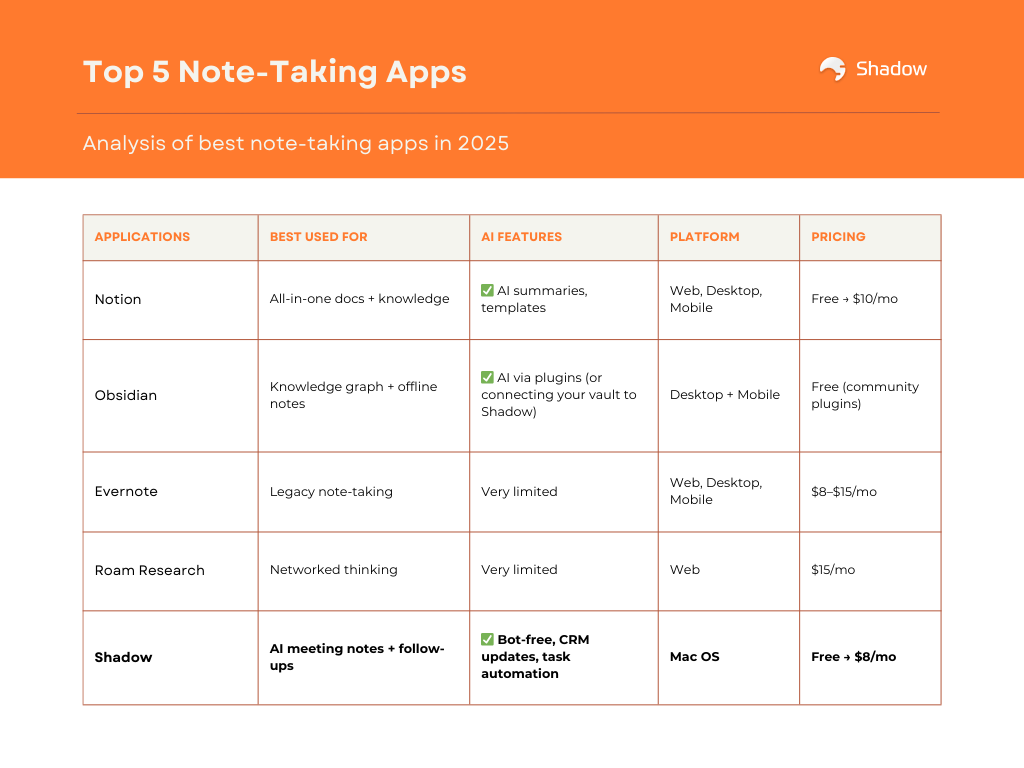The 5 best note taking tools in 2025 you need to have
.png)


Note-taking has evolved far beyond typing thoughts into a digital notebook. Today’s best apps do more than capture text. They help you organize knowledge, connect ideas, and even automate what happens after the notes are taken.
Whether you want an all-in-one workspace, a personal knowledge graph, or an AI assistant that turns conversations into outcomes, there’s a tool for you. Here are the five best note-taking apps in 2025.

Notion continues to be the most versatile note-taking platform available. It can serve as your second brain, a team wiki, or a full project hub. With pages, databases, and built-in AI, Notion scales from personal journaling to managing company-wide knowledge.
The real power of Notion is its flexibility. You can build task systems, connect docs, and even spin up lightweight CRMs all in one place. The trade-off is that it requires some setup before it feels seamless. Once configured, Notion can truly become the center of your work.
TL;DR
Obsidian has built a loyal following among researchers, writers, and developers. It stores your notes locally in Markdown and connects them into a living knowledge graph. Each backlink surfaces hidden connections, turning your notes into a web of ideas.
Obsidian’s plugin ecosystem makes it more than a note-taking app. With the right setup, it can function as a research system, task manager, or writing studio. It takes some time to learn, but for those who want deep control and ownership of their data, Obsidian is hard to beat.
TL;DR
Evernote set the standard for digital note-taking years ago and remains one of the most recognizable names in the category. It syncs reliably across devices and handles text, images, and files with ease. For many users, it’s still a dependable way to capture and find information quickly.
Where Evernote lags is innovation. Compared to newer tools with AI features and advanced workflows, it feels dated. Still, for long-time users who have years of content stored inside, Evernote delivers familiarity and stability.
TL;DR
Roam Research introduced a different way of thinking about notes. Instead of storing information in folders, Roam encourages you to connect ideas as you go. Each note can link to another, creating a dynamic network of knowledge that surfaces relationships you might not have noticed otherwise.
This non-linear approach is powerful for researchers, strategists, and knowledge workers who prefer connections over rigid structure. The experience is unique but less intuitive than other apps, and it comes at a premium price.
TL;DR
Shadow redefines what note-taking means in 2025. Instead of focusing only on text, it tackles the most overlooked part of modern work: meetings. Shadow runs in the background without sending a bot into the call, which keeps conversations natural and compliant. After the meeting ends, it doesn’t just produce a transcript. It creates a clean summary, highlights key decisions, extracts action items, and pushes updates into tools you already use.
What makes Shadow unique is that it closes the loop between information and action. Students can use it to review lectures without worrying about missing details. Freelancers can turn client calls into task lists. Teams can feed updates directly into Slack, Notion, HubSpot, or Linear. Executives can walk out of a meeting and know that next steps are already documented and assigned.
Shadow isn’t just a note-taking app. It’s a productivity engine that transforms conversations into outcomes.
TL;DR
👉 Related: How to Use AI to Automate Meetings
Each app here reflects a different philosophy of note-taking. Notion is the flexible all-in-one. Obsidian is the local-first system for power users. Evernote is the dependable classic. Roam is the choice for connecting ideas in a network.
Shadow is the one that points to the future. It doesn’t just capture what happened. It ensures something happens next.
